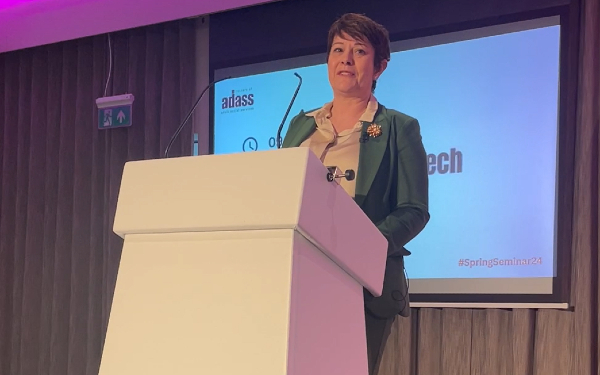
Social care must be protected from the “catastrophic” impact of increases in employers’ national insurance contributions (NICs), the Association of Directors of Adult Social Services (ADASS) said today.
ADASS revealed that, by its calculations, local authorities would face £1.8bn in extra costs in 2025-26 due to increases in employers’ NICs and the national living wage (NLW) announced in last month’s Budget, along with inflation.
This is lightly less than the £2bn in additional costs to councils from the Budget calculated by think-tank the Nuffield Trust in research published last week.
The news came as sector leaders gathered in Liverpool for the National Children and Adult Services Conference (NCASC), which was opened by ADASS president Melanie Williams.
Budget’s ‘catastrophic’ impact on social care
In her speech, Williams said: “The budget had catastrophic impacts on the cost of adult social care – not just for local government, but also for out important partners who support people in their neighbourhoods and places in our voluntary and community sector.”
She added that, if councils had almost £2bn spare for adult social care, they would be implementing the planned reforms to the charging system – scrapped by Labour shortly after taking power – and “a really decent early help and prevention service in all of our places”.
“Should we end up having to give a big chunk of this money to government, the consequences are unimaginable on our ability to meet need,” Williams said.
The government has implied that councils will be exempt from the rise in employer NICs but has not spelt out the details of this.
Providers planning to cut jobs and care
However, it has offered no such protection to care providers, which the Nuffield Trust has estimated will face £940m in extra costs from the measure in 2025-26.
A survey by umbrella body the Care Provider Association, released yesterday, found that providers would have to cut jobs and the amount of care they provided as a result of the Budget measures, including the rise in the NLW.
In calling for social care to be protected from the NICs rise, ADASS said potential options included delaying the implementation of the increases, lowering the planned rate of the tax, exempting providers or paying councils compensation.
‘Immediate government funding is essential’
The Local Government Association issued a similar message to Williams, with its social care spokesperson, David Fothergill, saying: The consequences of inaction will be leaving people without the support they need and further embedding a two-tier care system.
“Immediate government funding is essential to protect these services and ensure councils can continue to fulfil their vital role in supporting communities.”







 Bournemouth, Christchurch and Poole
Bournemouth, Christchurch and Poole  Hampshire County Council
Hampshire County Council  Oxfordshire County Council
Oxfordshire County Council  South Gloucestershire Council
South Gloucestershire Council  Wokingham Borough Council
Wokingham Borough Council  Webinar: building a practice framework with the influence of practitioner voice
Webinar: building a practice framework with the influence of practitioner voice  ‘They don’t have to retell their story’: building long-lasting relationships with children and young people
‘They don’t have to retell their story’: building long-lasting relationships with children and young people  Podcast: returning to social work after becoming a first-time parent
Podcast: returning to social work after becoming a first-time parent  How managers are inspiring social workers to progress in their careers
How managers are inspiring social workers to progress in their careers  Workforce Insights – showcasing a selection of the sector’s top recruiters
Workforce Insights – showcasing a selection of the sector’s top recruiters 

 Facebook
Facebook X
X LinkedIn
LinkedIn Instagram
Instagram
Proof of proof was still needed that ADASS is more concerned about protecting the profits and dividends pay outs of tax avoiding offshore registered hedge funds than quality care and choice for vulnerable people.
When did ADASS become an advocate for private businesses?
Perhaps ADASS would like to scrap the National Living Wage to workers alongside the ‘burden’ of employer NIC which amongst other things funds their State Pensions, something ADASS leadership is unlikely to be concerned with given their own inflation proofed final salary scheme pensions.
Asking tax payers to fund the profits and dividends of private enterprises while accepting that they continue to provide overpriced but generally substandard care is a novel way to define choice, dignity and safety.